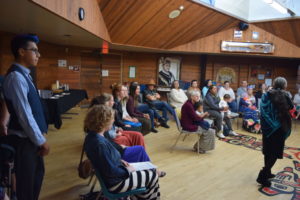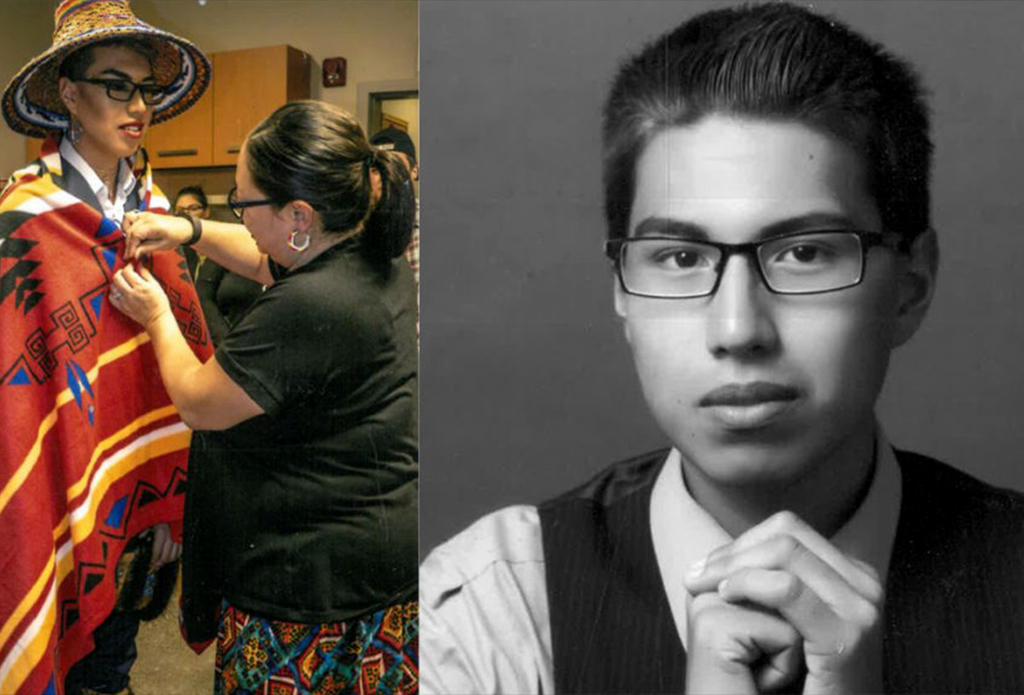Alex is a youth-in-care who is reclaiming his Dene heritage and reconnecting with his family.
Watch: Meet Alex | Former Youth in Care
My name is Alex and I am an 18-year-old proud Dene person who belongs to the people from the Northwest Territories. However, just four years ago I was missing half of my identity—I did not know my culture, my territory and I had never met my Indigenous family. That changed when I first entered care three years ago. My Métis caregivers (I call them my uncles) guided me on my journey where I reclaimed my family, culture, and identity.
Having contact with your family is culture. As a child, I had no contact with any of my maternal family. When I shared this with my uncles, they immediately sought out my Indigenous family. A few weeks later I learned that my younger brother was attending school across the street from our house and I had an even bigger shock when my uncles arranged for four of my six siblings, cousins, nephews, and Indigenous family to come for Thanksgiving supper.
Having an extra nine aunts and uncles with 50 first cousins who love me and support me has created resiliency and a sense of belonging for me.
I had been reunited with my “lost” family and I finally got a picture of who my mother was. I had never met her as she had passed when I was younger. My uncles invited my little brother over every month for a sleepover for over two years so we could build a strong relationship. They invited my Indigenous family over for BBQs, Easter, Thanksgiving, and Christmas dinner and my uncles arranged to have my little brother reside with us last year which has made everyone happy. Having an extra nine aunts and uncles with 50 first cousins who love me and support me has created resiliency and a sense of belonging for me. My uncles helped nurture my cultural identity by creating multiple family trees on the living room walls of our home.
Culture is incorporated into our home. My caregivers refer to me as their “nephew” as this is their cultural practice. This makes me feel important and respected. Every Sunday at supper time we each say one thing we are thankful for so that we learn to be mindful, humble, and respectful. The cultural theme of sharing and working (wolf teaching) together in the home is heavily role modeled and communicated.
We practice smudging and drumming at home and in the community which helps to reduce my anxiety and depression. Cultural practices have mended our relationships when words could not. Once, my uncle and I were upset with each other for a couple of days. My uncle asked if I wanted to smudge and I don’t know how, but afterward, everything felt resolved.
We practice smudging and drumming at home and in the community which helps to reduce my anxiety and depression. Cultural practices have mended our relationships when words could not.
I am grateful that my uncles did not give me the choice in refusing to attend or participate in cultural activities. We attend cultural events together as a family and purchase traditional foods like dry fish which we all crave. My caregivers purchase Indigenous art, clothing, or jewelry for me so that I can proudly wear or display it. This practice slowly made me feel a sense of cultural pride and belonging. My caregivers arranged for me to pick the medicine sage with Vancouver Aboriginal Child and Family Services Society and then showed me how to make sage oil at home. My uncle bought me art supplies so I could create Indigenous paintings that are hung throughout our home and at my uncle’s office. My uncle shares with us one of the seven sacred teachings or other traditional stories weekly which have taught me our important values. If we have a “family meeting” we will all smudge and do a drum song beforehand which reduces tension and reminds us to be respectful with our words and listen.

My uncles taught me about my Dene culture by taking me to my home reserve for the first time to visit all my family and go fishing. I also learned how to pay my respects to my mother which was healing for me. My uncle understood the significance of this visit and my struggle between the happiness to meet my family versus the anger from the sense of loss that it took 17 years to go home. I had my first piece of regalia made, my mukluks (traditional footwear). My mukluks are special as they have symbols of my family, nation, and territory on them. I have transferred these cultural symbols to my new drum. My uncle and I participated in the Hoobiyeee 2017 drum drill while wearing our regalia gave me much pride and confidence. My caregiver has called my band for cultural drumming music and even got the Dene phone app so we could learn my language.
The VACFSS workshops helped me develop my culture identity. My uncle even pulled me out of school so I could attend therapeutic cultural workshops. In the workshops I listened to the Elders and learned from them. I made a drum, cedar headbands, pine needle baskets, painted miniature paddles and more. I love more than anything volunteering with our Vancouver Aboriginal Child and Family Services Elder April at various ceremonies each year.
My two uncles have guided my cultural journey by giving me the tools to reclaim my Indigenous family, culture and identity. I am much stronger than four years ago when I struggled with depression and anxiety. I strongly identify with my Indigenous culture and I know how to seek the cultural tools to guide me further. My culture has saved my life.
Mahsi Cho
Alex M










